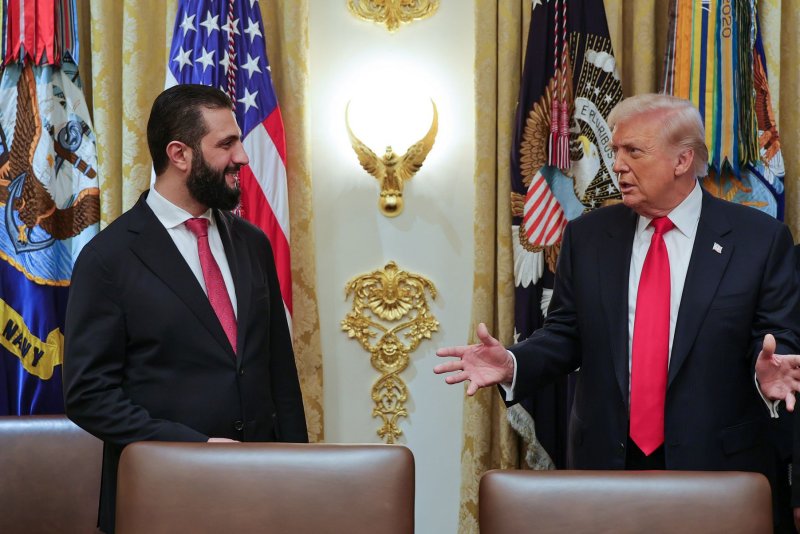Top Stories
Syrian Leader Sharaa Gains Global Support Amid Home Challenges

BREAKING: Syrian leader Ahmed Sharaa has secured significant international backing during his recent meeting with U.S. President Donald Trump, but faces critical challenges at home that could define his leadership. The meeting took place on November 12, 2023, marking a pivotal moment in the historically complex U.S.-Syria relations.
Sharaa’s visit to the White House comes as he seeks to distance his administration from the controversial past of his predecessor, Bashar Assad, who was ousted on December 8, 2024. Trump’s endorsement of Sharaa as a “strong leader” has bolstered hopes for a fresh start in Syria, with discussions primarily focused on economic recovery and national security.
In a significant development, Sharaa aims to lift sanctions imposed during Assad’s regime. Although only U.S. Congress can fully repeal the sanctions under the Caesar Act, Sharaa secured a critical 180-day suspension to help stabilize his nation. This move is a key step in his strategy to rebuild Syria’s economy.
Sharaa’s leadership is characterized by a commitment to fighting terrorism. By joining the U.S.-led global coalition against ISIS, Syria has become the 90th country to participate, symbolizing a new era of cooperation with the United States.
However, Sharaa’s administration faces immense internal challenges. Political analysts emphasize that his greatest test will be fostering a credible and inclusive governance structure, crucial for national reconciliation. As Radwan Ziadeh, a senior fellow at the Arab Center in Washington, states, “Sharaa’s biggest challenge today is internal, not external.”
One of the most pressing issues is the ongoing need for post-war reconstruction. Nearly 90% of the Syrian population lives below the poverty line, highlighting the dire economic conditions. Many citizens express frustration, as one popular saying in Damascus puts it: “We have the prices of Las Vegas and the services of Somalia.” This stark disparity underscores the urgent need for international support.
While the U.S. has lifted certain sanctions, the question remains: What will Sharaa offer in return? Nizar Ghanem, co-founder of Triangle Consulting, points out the uncertainty surrounding Syria’s potential alignment with the Abraham Accords, which normalized relations between Israel and several Arab states. “Nothing looks clear,” he asserts.
Sharaa’s administration is navigating a delicate balance. In recent discussions, Trump has emphasized the need for progress towards a security agreement between Syria and Israel. However, challenges persist, as Israel is reportedly resistant to restoring the 1974 disengagement agreement.
“They want to change the facts on the ground, which is something no Syrian can accept,” Ziadeh warns, calling for increased U.S. pressure on Israeli Prime Minister Benjamin Netanyahu.
As Sharaa moves forward, his approach will be scrutinized closely. Observers wonder whether he will establish a new authoritarian regime or pave the way for a democratic process through elections. “We don’t know… the government has no vision yet,” Ziadeh notes.
With the international community watching closely, the stakes are higher than ever. Sharaa’s success or failure will not only impact Syria’s future but will also resonate throughout the Middle East. Can he transform the current trajectory into one of hope and recovery? Only time will tell.
As developments unfold, the world waits to see how Sharaa will navigate these critical challenges. Immediate actions are needed to ensure that Syria does not fall back into isolation, and that its people can begin to envision a brighter future.
-

 Science3 weeks ago
Science3 weeks agoInventor Achieves Breakthrough with 2 Billion FPS Laser Video
-

 Health4 weeks ago
Health4 weeks agoCommunity Unites for 7th Annual Into the Light Walk for Mental Health
-

 Top Stories4 weeks ago
Top Stories4 weeks agoCharlie Sheen’s New Romance: ‘Glowing’ with Younger Partner
-

 Entertainment4 weeks ago
Entertainment4 weeks agoDua Lipa Aces GCSE Spanish, Sparks Super Bowl Buzz with Fans
-

 Business4 weeks ago
Business4 weeks agoTyler Technologies Set to Reveal Q3 Earnings on October 22
-

 Entertainment4 weeks ago
Entertainment4 weeks agoMother Fights to Reunite with Children After Kidnapping in New Drama
-

 World4 weeks ago
World4 weeks agoR&B Icon D’Angelo Dies at 51, Leaving Lasting Legacy
-

 Health4 weeks ago
Health4 weeks agoCurium Group, PeptiDream, and PDRadiopharma Launch Key Cancer Trial
-

 Entertainment4 weeks ago
Entertainment4 weeks agoRed Sox’s Bregman to Become Free Agent; Tigers Commit to Skubal
-

 Health4 weeks ago
Health4 weeks agoNorth Carolina’s Biotech Boom: Billions in New Investments
-

 Science4 weeks ago
Science4 weeks agoNorth Carolina’s Biotech Boom: Billions Invested in Manufacturing
-

 Top Stories4 weeks ago
Top Stories4 weeks agoFormer Mozilla CMO Launches AI-Driven Cannabis Cocktail Brand Fast









